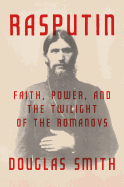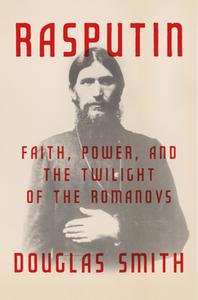
 Douglas Smith's Rasputin: Faith, Power, and the Twilight of the Romanovs may seem like a daunting read. Weighing in at more than 800 pages and featuring a level of detail that brings to mind Robert Caro's accomplished doorstops, Rasputin is not just another in a long line of biographies of the so-called "holy devil." Smith, the author of Former People: The Final Days of the Russian Aristocracy, has written the definitive account of Grigory Rasputin's life and times, correcting more than a century's worth of disinformation and propaganda surrounding a humble peasant who became a near-mythic figure.
Douglas Smith's Rasputin: Faith, Power, and the Twilight of the Romanovs may seem like a daunting read. Weighing in at more than 800 pages and featuring a level of detail that brings to mind Robert Caro's accomplished doorstops, Rasputin is not just another in a long line of biographies of the so-called "holy devil." Smith, the author of Former People: The Final Days of the Russian Aristocracy, has written the definitive account of Grigory Rasputin's life and times, correcting more than a century's worth of disinformation and propaganda surrounding a humble peasant who became a near-mythic figure.
Smith questions every element of the mythos, even countering accusations of his criminal background as a horse thief through "a series of documents that have languished unnoticed... until now." That will become something of a refrain throughout the biography, as Smith not only reinterprets the work of his predecessors but also provides a wealth of new information about Rasputin and disproves countless claims made against the starets--a Russian term for a religious elder.
Rasputin's life is the stuff of biographers' dreams even without the traditional embellishments. Beginning with Rasputin's obscure transition from a Siberian peasant to a pilgrim wandering among Russian Orthodox holy sites, Smith explains how Rasputin developed his religious outlook: "[he] took in all that the Russian religious world had to offer but kept only that which suited him, fashioning in the process his own version of peasant Orthodoxy." And similarly, his famous talent for reading people: "he had seen nearly all there was to behold in the sprawling empire of the tsars and had moved among all manner of people.... His knowledge of the Russian social order was broad and his understanding of human psychology, deep."
Far from uncovering banal reality behind Rasputin's supposed mystical talents, Smith instead explains how the man's forceful personality came to have such an impact on intelligent, learned people such as the Tsar and Tsarina. He even puts forward a theory for Rasputin's seemingly miraculous ability to heal the young Tsarevich: "At a time when the medical profession had no way to treat hemophilia, and the fussings of the doctors only served to exacerbate Alexei's suffering, Rasputin's instruction to leave him in peace was vital to his recovery, especially when considered together with his words of hope of assurance that all would be well."
The Rasputin that emerges in Smith's portrait is strikingly different from the one that dominates the popular imagination to this day. In Smith's telling, Rasputin did occasionally fall prey to vice, specifically adultery and drinking to excess, but he was also devoted to his family, a sincere believer and a fervent supporter of the royal family as well as the peasant class he was born into. Rasputin's ascendancy frightened some important Russians who began an enormously influential media campaign against him. That campaign was so successful that Smith's book reads like a revelatory work of revisionist history, unearthing a flesh-and-blood person from a century's worth of lies and exaggerations. --Hank Stephenson, bookseller, Flyleaf Books
Shelf Talker: Rasputin: Faith, Power, and the Twilight of the Romanovs is a massive biography of the famous Russian spiritual leader that may prove to be the definitive portrait of his life and times.

